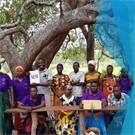When nations, technologies, and lifestyles change, the suppliers that survive are those that adapt, as we are seeing in West African banking. Banking services that exclude the unbanked are now creating opportunities for telecom services and financial start-ups, as inclusion, convenience and affordability become the defining points for the region’s financial services industry.
Thus, in September last year, phone app Wave raised more than $200m to expand its money transfer services in its largest market, Senegal, and other nations, following its April launch in Ivory Coast. Yet its core services are no different than a bank. The difference lies in how those services are delivered – which is, effectively, by using the agency banking model of setting up agents in less served areas, on mobile platforms.
The banking sector’s challenges begin with its inaccessibility, thanks to the limited number of bank branches concentrated in towns and cities, while the majority of the population still live in rural areas.
This sparsity of branches leads to much higher costs for customers, in both travel and time. For instance, Cameroon has around 2.2 bank branches per 100,000 people, while some 34.6 per cent of its adults hold a bank account, making for an average of nearly 8,000 customers per branch - that compares with a European Union average of 22.3 branches per 100,000 people and fewer than 3,500 customers per branch.
If customers only visit their branch once a month, that makes for 160 serviced customers each day in European branches compared to nearly 370 a day in Cameroonian branches, meaning Cameroonians face much longer queues at the bank, on top of the long journeys to get there.
Bank charges can also be high, and efficiency poor in Ivory Coast, where there are more bank branches per person than in Cameroon, at 4.9 branches per 100,000 people, an instant transfer from one bank account to other costs as much as CFA17,000 ($30) in transfer charges, takes up to three days to arrive, and sometimes fails altogether.
Against this backdrop of inconvenience and high costs, just 41.3 percent of adults in Ivory Coast hold bank accounts, and in many countries in the region, the total is even lower, for instance in Madagascar, at 17.5 percent.
Yet banking services are not universally unpopular in Africa. In Kenya, 88 percent of the population has a bank account, in Mauritius 89.8 percent do, according to analysis by ID documentation specialist Accuant.
The difference lies in the services their banks offer. In Kenya, for example, bank agents carried out 163 million transactions in 2019, up five-fold on the 30 million bank agency transactions in 2012. These included all the elements offered by telecom operators and start-ups, but from an existing base of security, brand recognition, organisational capacity and banking licences that allow savings too.
Moreover, studies from GSMA, which represents the global mobile communications industry, have found that agent networks have up to 20 times more reach than bank branches, and up to 7 times more reach than ATMs. While the IFC reports that agent transactions cost up to 25 percent less than branch transactions.
Agency systems have transformed onboarding too. Fidelity Bank Ghana can now onboard a new customer in just 5 minutes through agents.
As suppliers of agency software throughout Africa, we have seen many of these gains translate into rapid and sustainable growth - in fact, the agency banking model can bring more than 300% ROI within 3 years’ time. For example, we saw one microfinance supplier increase its points of sale 15-fold through the launch of an agent network, and another increase the volume of savings placed with it by seven-fold in a year. The IFC reports similar transformations, citing examples of a bank where 70 percent of the transactions are now placed through an agent network, reducing banking queues and improving customers’ experience.
Governments are also now using agency banking to deliver pensions and other support in hard-to-reach places. At the same time, thinktank CGAP has pointed to the ‘vital’ role of agency banking in COVID-19 responses, by ensuring financial reach while reducing transport use and crowding at branches.
It is also now possible to combine agency banking with mobile wallet-based digital banking, on a single, combined platform, to provide greater accessibility still. While new offerings such as our agency banking as a managed service are giving a faster and more accessible go-to-market model to financial organisations of different sizes.
This means that, despite all the fanfare surrounding new financial service apps, it is banks that are best able to mobilise new investments into agent infrastructure with wider services and faster gains and growth. Thus, the start-ups get called ‘unicorns’ and raise hundreds of millions of dollars, but it may well be the banks that end up providing financial services to the majority: through agents.






